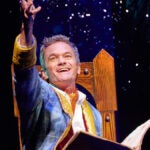
It must have been something like this in the theater when Victorien Sardou wrote popular potboilers like “Fedora” and “La Tosca” for Sarah Bernhardt. The Divine Sarah and her scribe are long gone, but the Pulitzer Prize-winning playwright Doug Wright (“I Am My Own Wife”) and author of Disney’s “The Little Mermaid” is very much here to write a stage vehicle for Sean Hayes of “Will & Grace” fame. Based on a turbulent few hours in the life of Oscar Levant, “Good Night, Oscar” opened on Broadway at the Belasco Theatre after its world premiere last year at Chicago’s Goodman Theatre.
If Bernhardt could have sung, Sardou would have written her arias; instead, he left it to Umberto Giordano and Giacomo Puccini to supply those in the next century. Hayes more than sings as Levant in “Good Night, Oscar.” He plays the piano with the talent of a virtuoso, and Wright obliges by writing the play’s penultimate scene so that the actor can perform arguably the most paranoid version of “Rhapsody in Blue” ever delivered anywhere in the world. The actor’s acceptance of the audience’s rapturous applause is pure divo, and the moment guarantees Hayes a Tony Award.
George Gershwin (John Zdrojeski) makes brief appearances as a ghost so that he can haunt Levant. Wright focuses this bio play on what might have been the most anxiety-ridden interview for this celebrated wit, pianist, composer and Hollywood second banana. It is 1958 and Levant’s wife June (Emily Bergl) has finagled him a four-hour pass from the Mt. Sinai Hospital mental ward in Beverly Hills so that Levant can appear on the “Tonight Show,” hosted by Jack Paar (Ben Rappaport). Wright wisely sets up the human nightmare that is the drug-addicted and shock-treatment-prone Levant by having June and Jack, as well as NBC top brass Bob Sarnoff (Peter Grosz), kick off “Good Night, Oscar” by asking repeatedly and hysterically, “Where is Oscar?!” It’s show time at the nascent talk show and one by one the three characters click off all the times Levant has stiffed other producers and impresarios by walking off stage or simply not showing up.
It’s quite a list of neurotic anecdotes, and when Hayes finally makes his purposefully delayed entrance in the “Tonight Show” green room in the play’s following scene, the Levant he delivers is far worse than anything previously said about this mad man. Levant is such a Boeing 707 plane wreck as played by Hayes that it may come as a shock to learn that the real man lived another 14 years after the infamous “Tonight Show” debacle depicted here.
How bad a mess is Levant as played by Hayes? Try to imagine Dustin Hoffman’s Ratzo Rizzo in “Midnight Cowboy” if the street hustler had taken a bath. Hayes gives Levant that same whine of a voice and the same palsy of the hands, doused with lots of obsessive compulsive disorder behavior. He also uses several sheets of Kleenex to shake Sarnoff’s hand. It is a bravura transformative performance that leaves not a flicker of the Omega male characters Hayes played on “Will & Grace” and onstage in “Promises, Promises.” Under Lisa Peterson’s efficient direction, the other actors deliver fairly generic performances, careful not to get in the way of the star. The one exception is the daffy sycophant-gofer played by Alex Wyse, who more than once steals the spotlight from Hayes.
Like any star vehicle, “Goodnight, Oscar” occasionally strains to keep its focus on the anointed royalty. Once the chronically late Levant finally does show up at NBC, he seems to have ample time pre-appearance on “Tonight” to entertain us with his one-liners and his hallucinations, which include visits from the dead Gershwin wrapped in stage fog. The contrived suspense is on a level with the contrived rivalry between Gershwin and Levant, whom Wright reduces to a mere hack despite his having written several popular songs and the scores for over 20 movies. If nothing else, the “Amadeus” feud, with Levant being Salieri to Gershwin’s Mozart, is efficient storytelling that provides the Rosebud key to what’s wrong with Levant.
Seated across from Paar on the “Tonight” set, Levant delivers his very best one-liners. Yes, he actually said on live TV back in the late 1950s, “Now that Marilyn Monroe is kosher, Arthur Miller can eat her.” Elsewhere in his play, Wright writes other zingers that are almost as good, although some 20-20 hindsight comments about the future of television should have been cut back in Chicago.
















